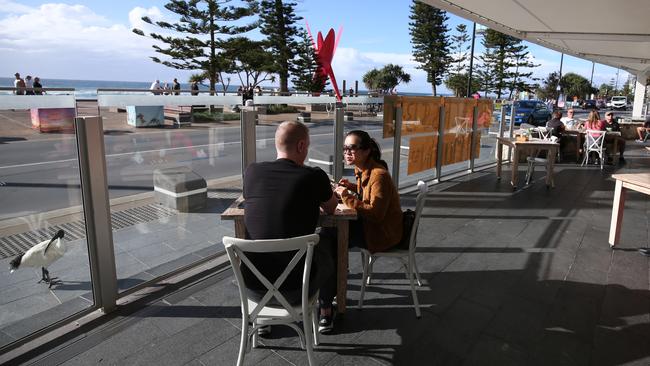
The federal budget was delayed, and in its place Treasurer Josh Frydenberg and Opposition Leader Anthony Albanese presented economic statements last week. Frydenberg conceded the economic outlook was “sobering”. Treasury has forecast GDP to fall more than 10 per cent in the June quarter, a $50bn loss equal to the combined quarterly production of the ACT, Northern Territory, Tasmania and South Australia. Business investment and dwelling investment are expected to be 18 per cent lower.
The impact of the pandemic on our economic future is uncertain, but the picture is bleak. Almost a million Australians lost their jobs in the five weeks to April 18. Australian Bureau of Statistics labour force data published last week shows the number of unemployed rose by about 100,000 in April, putting the unemployment rate at 6.2 per cent. The real figure is likely to be significantly higher, but it is obscured by the number of people receiving JobKeeper payments.
Treasury forecasts that in the June quarter, about 1.4 million will be without work. It is not known how many will lose their livelihoods as a result of permanent businesses closures.
The Coalition government has committed $320bn in financial support for the COVID-19 crisis. The Treasurer has revealed that wage subsidy packages cost taxpayers more than $20bn a month. There are 1.6 million people on JobSeeker and six million people on JobKeeper. Economics editor Adam Creighton observed that more than 72 per cent of the labour force is employed by government or receiving welfare payments under the JobKeeper and JobSeeker schemes. But politicians are resisting calls to reduce their salaries or rationalise the public service.
Each week, the nation is accruing billions in debt for fear of the coronavirus. At the time of writing, 6301 of 6989 recorded COVID-19 cases had recovered. The majority of states and territories had no new cases during the past 24 hours. In the year to date, 98 people have died from the virus in Australia. By way of comparison, there were 4269 deaths from pneumonia in 2017.
The anticipated health disaster of COVID-19 has been prevented by keeping people indoors. State governments are beginning to ease restrictions, but the go-slow approach is preventing economic recovery. Measures such as restricting restaurants and cafes to outdoor seating or permitting pubs to open but only to a small number of patrons pose a problem. Businesses cannot turn a profit under such conditions. Most require rapid turnover of customers to be viable.
There is a growing gap between the evidence about COVID-19 cases in Australia and progress on opening the economy. Despite only one active case of COVID-19 in the state, the South Australian government is keeping large parts of the economy in an induced coma. The restrictions are easing, but rather slowly for a state hit hard by job losses and drowning in debt. It is in dire financial straits. Earlier in the year, Treasurer Rob Lucas warned of a deeper dive into debt after having delivered a 2019 budget with record borrowing commitments. He said: “There’s nothing … the SA government can do about the impact and ramifications of the coronavirus.” A government that embraces uselessness in a time of crisis does not deserve to govern.
In Victoria, where the virus has wreaked havoc on health and jobs, the Labor government is talking up deficits as though they cannot be helped. Treasurer Tim Pallas revealed a state deficit of $773m. The government will not deliver a surplus, but he said it will “put a surplus of effort into looking after the welfare of Victorians”. At the same time, Pallas has been putting a fair bit of effort into defending the Chinese Communist Party with whom his government has signed a deal for the Belt and Road Initiative. During a Victorian parliament coronavirus inquiry, he said the CCP decision to suspend imports of Australian meat was a result of “language that … has seemed to vilify China”.
The federal government is preparing to manage the increase in COVID-19 cases that will come with the reopening of the economy. It faces the task of balancing health advice with fiscal repair and a plan for prosperity. However, a reform package that features significant reduction in government spending is yet to appear. Neither major party has committed to rationalising programs, projects or the public sector. The Prime Minister rejected calls to reduce the salaries of politicians and public servants. While 72 per cent of Australians depend on the state, there will be little demand for reducing the size of government. Once the money runs dry, that may change.
In the US, Republicans have read the public mood and drafted a bill that would allow for the regular review of state programs, agencies and commissions. Under the proposed accountability legislation, agencies and commissions would provide congress with a report to justify why their functions continue to be necessary; why they could not be better performed by the private sector or another agency or commission; and what efficiencies taxpayers realise by their continued operation.
Despite having a certain reputation for profligacy, good public servants know that in times of economic need, efficiencies must be found. Regular organisational review is the fairest process to bring about needed change.
There are many pitfalls and no shortcuts on the road to recovery. To date, the government has prioritised the health risks posed by the virus. The time of economic reckoning is nigh.




The federal government has played a vital role in responding to this crisis with extraordinary measures. The worst-case health scenario has been averted for now. But the nation is being pushed further into debt by a reluctance to open the economy with the same degree of urgency that it was shut down. Restarting the economy is no easy task in a pandemic, but it must be the priority if we are to avoid a public debt crisis.